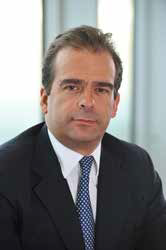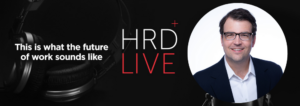Waking up from 40 years of depression and anxiety
- 9 Min Read
To mark national World Mental Health Day we met with Brian Heyworth, Global Head of Client Strategy at HSBC. He told us his in-depth personal story about having a psychological breakdown, keeping professionalism in mind and never recovering but learning to crisis manage himself from the depths of despair into a happy and fulfilled, albeit work-obsessed life.
- Author: Emily Sexton-Brown
- Date published: Oct 9, 2018
- Categories

 Brian Heyworth was one of HRD Connect’s key leaders involved in our ‘Mental Health Role Models’ campaign running throughout National Mental Health Week which took place earlier this year. In his position of leadership, Heyworth decided to speak publicly about his personal mental health and by doing so he may have empowered others within the organisation to feel more secure about living with a mental health issue. When culture is role modelled from the top down it has the power to permeate change and perceptions throughout companies.
Brian Heyworth was one of HRD Connect’s key leaders involved in our ‘Mental Health Role Models’ campaign running throughout National Mental Health Week which took place earlier this year. In his position of leadership, Heyworth decided to speak publicly about his personal mental health and by doing so he may have empowered others within the organisation to feel more secure about living with a mental health issue. When culture is role modelled from the top down it has the power to permeate change and perceptions throughout companies.
Here is Heyworth’s story…
I was greeted by a relaxed and bountiful Heyworth, to any onlooker he was confident, happy and incredibly successful. We were joined his trusted friend and colleague who evidently knew his story which again was refreshing as I’d envisioned a financial working environment to be closed off, and impersonal – I must stop making these ill-educated judgements.
Downward spiral
“In 2006 I spent two months in hospital, after being diagnosed with a severe psychological breakdown aided by excessive drinking, I was 40 years old. In hindsight, it’s clear that I’d been suffering right back to my teenage years” said Heyworth.
Traveling up the career ladder in a fairly traditional sense, Heyworth worked for three global banks and was the epitome of ‘successful banker’. However, for years Heyworth was developing numerous coping mechanisms to mask how he was actually feeling; continuously trying to be funny, an endless need to please and drinking more than the average were a few examples of these coping strategies.
“I don’t think the people who hired me thought it was a daunting decision – their rationale was, ‘this man has been ill, he’s not ill anymore, we want to hire him’. I’m not in any way de-emphasising their decision, I’m making the point that it’s indicative of the people – they didn’t stigmatise it.”
“In my 30s I has a couple of periods when I went to see the doctor who put me on antidepressants which was the short-term fix, but it was clear in the last year before my breakdown that I was severely struggling.”
He continued: “I was losing weight, I wasn’t sleeping, I’d become so good at pretending, but the truth was, at one point I’d become suicidal. I was on a rapid downhill path.” I began to question that if these learned behaviours had become so instilled into his daily routine, how was he ever going to break this cycle?
Having to live in partial denial about your own mental health can be exhausting and really impact across all aspects of your life. I was intrigued to find out how Heyworth ended up at HSBC as he had suffered his break down whilst at previous job.
“I’d already been in talks with HSBC, I was speaking to Stuart Gulliver, the then CEO of Global Banking and Markets at HSBC and was in talks about a senior role at HSBC. My plan was to try and get the job, then take 3 months off,” he said. He explained that he collapsed towards the end of 2005, and over that Christmas period he was really struggling. “I ended up being unable to continue, I found myself in The Priory soon after.”

Heyworth spent a further two months in hospital, he then spent a month with his parents in Lancashire, where he was told by doctors to repeat a relaxed and rather mundane lifestyle, ensuring he did small tasks at the same time every day to help aid recovery. In the summer that followed, he reached out to HSBC and explained what had happened. They asked him two questions, ‘Can you do the job?’ and, ‘Are you ok?’, the answer to the first question was yes, the second was slightly unknown at that point. He started work at HSBC in October 2006, “It was an extraordinary six months” he said.
Most people don’t want to share something as personal as Heyworth did with a potential employer before accepting the role, for fear of judgement. “I don’t think the people who hired me thought it was a daunting decision, their rationale was, ‘this man has been ill, he’s not ill anymore, we want to hire him’. I’m not in any way de-emphasising their decision, I’m making the point that it’s indicative of the people – they didn’t stigmatise it.”
“The fact is that I had a severe psychological breakdown, I’m still on anti-depressants and there have been numerous discussions over the last 12 years determining whether it is bipolar or not, but I think the general medical opinion was that it isn’t – it’s something caused by depression and anxiety,” Heyworth said.
Building trust
Heyworth said one of the hardest parts for him was talking openly about his condition: “Deep down I was scared of talking to my doctor, I was scared of talking to my wife, I was scared of talking to my employer, it’s very isolating.”
Reflecting on the past 40 years, Heyworth said: “The best metaphor I can think of to describe my situation is as if I’d had gradually worsening sight, from 10 to 40 years old my sight had been deteriorating, by the time I got to 40 I was almost blind. However, I’d managed to adapt, but because I’d never experiences 20/20 vision I wasn’t aware of how blind I’d become. Extraordinarily, now 12 years later, it’s as if I have got 20/20 vision. Every day is an absolute delight.”
“I also think it’s very arrogant of people in the city to assume that their jobs are more stressful than other peoples, be it a nurse, or a fireman – in any job you have pressures and stress. I completely reject that it was the city that caused my breakdown.”
I wanted to know whether Heyworth ever spoke to his colleagues about his personal experiences, especially when he first returned to work from hospital, he responded: “I was very raw, attitudes in society were different (in 2006) and I didn’t talk about it. People were aware that I didn’t drink – my colleagues and clients were all aware that I’d been in The Priory and that was the case for my first few years at HSBC.
“After a few years, I was asked to speak about my personal experiences internally. At that point I’m not sure that many people were speaking outwardly about it, form memory I think it was Alistair Campbell, Ruby Wax, Stephen Fry but not many, or any from business but now it’s becoming more prevalent which is great. After that I got involved in the City Mental Health Alliance, which I’m still a part of now. I don’t think in terms of “recovery”, more a matter of trying to continue to improve myself.”
Routine and stability within work and life has helped Heyworth, he said: “I like that I have to be at work early, I like being busy. I’ve learnt to channel my predilection for excitement and addiction into healthier things, I’m now in real danger of now being addicted to work.”
“I think that showing vulnerability is attractive, it helps foster better relationships.”
Heyworth spoke about the importance of belonging and how he used to go to AA meetings which helped facilitate him to actually talk about his issues. “I don’t go to AA anymore, but if you gather in a network of likeminded people where you listen and talk, it helps. The more open you are, the more open people are with you. I would have to say that the most wonderful thing about the last 12 years is my strengthened relationship with my family and friends through being open and honest.”
Financial sector
Working within the financial sector can holds an association with stress, suits and pressured deadlines. When I approached this as a possible catalyst Heyworth immediately disagreed, “I think it’s very arrogant and completely unacceptable to have this outlook. I would have had the same experience had I been working in a sweet shop – I wasn’t well.
“I also think it’s very arrogant of people in the city to assume that their jobs are more stressful than other peoples, be it a nurse, or a fireman – any job has pressures and stress. I completely reject that it was the city that caused my breakdown.” I was deeply refreshed by his outlook and had never this point of view before – especially from an individual who had worked in the financial sector for his entire working life. He continued, “Perhaps parts of it was job related, but deep down it could have easily been a bad month of sweet sales had I worked in a sweet shop – if you’re ill, these things become the reason for instability.”
Vulnerability and strength in business
For Heyworth leaders need to adopt new approaches to mental health. “I think that showing vulnerability is attractive and it helps foster better relationships. This is not a traditional approach in companies, in particular banks. But for me, I’m very comfortable in who I am. My behaviour fortunately seems to align well with HSBC and their outlook for employees,” he explained.
Heyworth is fortunate to be within an inclusive and accepting working environment who has allowed him to flourish by being himself, but what happens when employers don’t share these attitudes?
I asked Heyworth how leaders should empower their employees about their own mental health taking examples from HSBC, he said: “In the last few years, HSBC have really started opening up the conversation about mental health for employees all around the world – who have entirely different experiences and needs to each other in their lives.” Heyworth explained that this includes people telling their stories, training senior leaders in mental health (and including this within their objectives) with a view to changing cultures and adapting the entire business to behave in a more enlightened way. HSBC hopes this will strengthen the company culture and in turn help economically because productivity will rise, and absenteeism will decrease.
Heyworth spoke about the challenges when addressing mental health in a global organisation, he explained: “We need to consider that a conversation about mental health will differ worldwide. We have 240,000 people globally at HSBC in 70 countries. Chinese employees could have different issues to those in Mexico. We need to start integrating mental health into some bigger conversations around ‘energy’ and ‘behaviour’ which is all encompassing without always labelling it as ‘mental health’.








